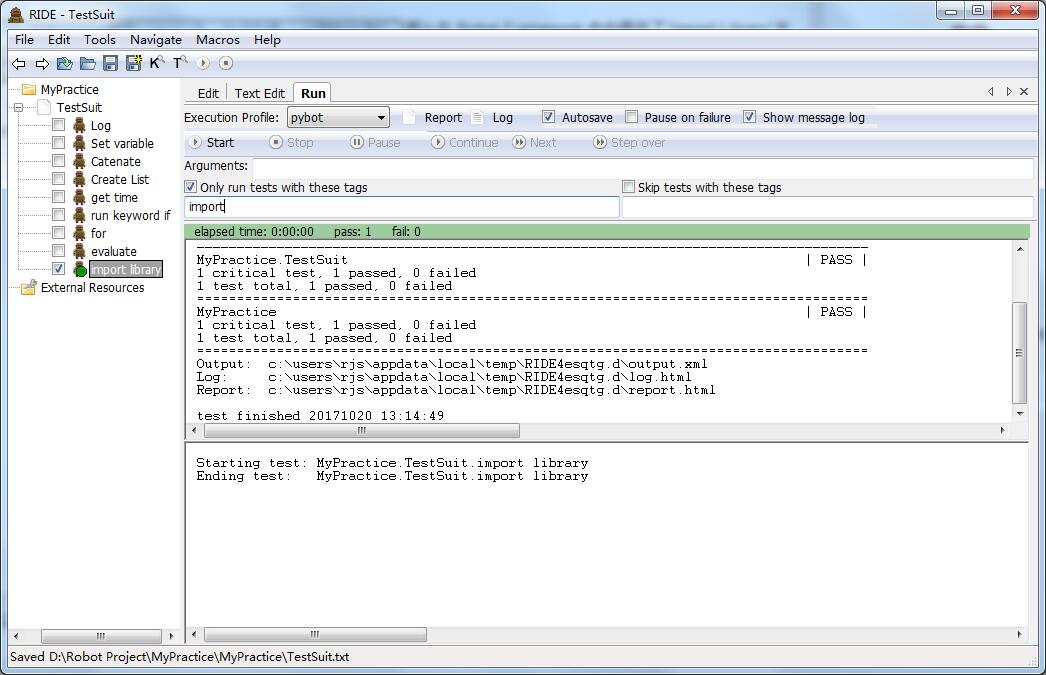
- Generate random string in robot framework how to#
- Generate random string in robot framework code#
- Generate random string in robot framework password#
In the firs XML file the values of ORD, CLI & TOW needs to be changed and in the second XML file WOR & WRQ need to be changed but the value of ORD in the second file needs to same as the value of ORD in first file. The first XML file is something like this: Īnd the second xml file looks like this:
Generate random string in robot framework how to#
I've used faker library to generate random number but I don't know how to update them in XML. Next thing is to create a file for our custom library which we will be used to. I would like to know how should I be able to update the values in the XML file using Robot Framework. The first thing to do, to achieve this is to create a folder in the root of the project we have i.e. The following command will do just that.I've two XML files in which I manually change the values before proceeding with further evaluation. Generate Random String 5-10 Generates a string 5 to 10 characters.
Generate random string in robot framework password#
Now we can create an encrypted SSH password for our remote host using that passphrase. String is Robot Frameworks standard library for manipulating strings (e.g. The population sequence chars contains the characters to use when generating the random string.
 Replace my-ansible-vault-pw with a random string of your choosing. Generates a string with a desired length from the given chars. As all lookups, this runs on the Ansible host as the user running the playbook, and “become. Empty files cause the password to return as an empty string. 1234,00 from which I would like to select only the 4 primary digits, meaning I. To clarify, what I intend is to have a price, i.e. This can be used when you need a password without storing it on the controller. In the Robot Framework library called String, there are several keywords that allow us to use a regexp to manipulate a string, but these manipulations dont seem to include selecting a substring from a string. The password lookup will generate a new random password each time, but will not write it to /dev/null. Use Select from list by index keyword on your list (from Selenium2Library) using the random index you generated in the previous step. We have people using ansible in a heterogeneous environment, so trying to rely on either password or passwordlookup simply won't work for us since I either have to run some string of LOCAL commands (problem because of people running ansible on different platforms), or they refer to a file (bad practice to pass around password files). generate a random index using Generate Random String or sample like mentioned in this question. I primarily use only the commands `ansible` and `ansible-playbook`. robot -rerunfailed 'output.xml' -output 'rerun.xml' suite.robot. We will be using those information to get the list of failed cases and running them again using rerunfailed options. What I need recorded are primarily the inventory and limits used, as well as the roles/playbooks/tags deployed. This output.xml is responsible for generation of these two html file and contains all the information related to executed automation code.
Replace my-ansible-vault-pw with a random string of your choosing. Generates a string with a desired length from the given chars. As all lookups, this runs on the Ansible host as the user running the playbook, and “become. Empty files cause the password to return as an empty string. 1234,00 from which I would like to select only the 4 primary digits, meaning I. To clarify, what I intend is to have a price, i.e. This can be used when you need a password without storing it on the controller. In the Robot Framework library called String, there are several keywords that allow us to use a regexp to manipulate a string, but these manipulations dont seem to include selecting a substring from a string. The password lookup will generate a new random password each time, but will not write it to /dev/null. Use Select from list by index keyword on your list (from Selenium2Library) using the random index you generated in the previous step. We have people using ansible in a heterogeneous environment, so trying to rely on either password or passwordlookup simply won't work for us since I either have to run some string of LOCAL commands (problem because of people running ansible on different platforms), or they refer to a file (bad practice to pass around password files). generate a random index using Generate Random String or sample like mentioned in this question. I primarily use only the commands `ansible` and `ansible-playbook`. robot -rerunfailed 'output.xml' -output 'rerun.xml' suite.robot. We will be using those information to get the list of failed cases and running them again using rerunfailed options. What I need recorded are primarily the inventory and limits used, as well as the roles/playbooks/tags deployed. This output.xml is responsible for generation of these two html file and contains all the information related to executed automation code. 
Read the information that follows for important application notes.
Generate random string in robot framework code#
Heres some fairly simple and very flexible code for generating random identifiers. Relatively new to using Ansible and would like to know if there's a way I can record/save what I deployed to some file. To generate a random string, concatenate characters drawn randomly from the set of acceptable symbols until the string reaches the desired length.






 0 kommentar(er)
0 kommentar(er)
